
WHAT IS THE BEST ARTIST PAPER FOR ME?
There is no simple answer to this question. Many individual factors, such as your medium, subject and budget, come into play. Couple this with the enormous choice on the market and it can be overwhelming. But one thing is for sure – artist paper should be acid free. This optimises its structure, minimises deterioration and prevents fading and yellowing.
WHAT MATERIAL OF PAPER SHOULD I PICK?
Paper is made from interwoven fibres which, in the case of fine art papers, are often plant fibres. For example, wood pulp is used to make cartridge paper, a paper typically used for drawing and printmaking as it tends to be smooth with a very light, uniform grain.
Wood-free paper is, confusingly, made from wood pulp too, but the lignin that causes the paper to yellow and deteriorate is removed, upping its archival credentials. The best archival grade paper, however, is made from 100% cotton rag. Not only does it last the longest, but it is also the strongest and the most suitable for water-based media.
WHAT IS SIZING?
This sort of sizing is not referring to a paper’s measurements, but a glue-like sealant traditionally made of gelatin. Incorporated during the production process, “internal sizing” toughens the structure of the paper and increases its durability.
Meanwhile, “surface sizing” (also known as “tub-sizing”) involves size being applied to the surface and it is a feature that watercolourists should look out for.
Diese Geschichte stammt aus der October 2020-Ausgabe von Artists & Illustrators.
Starten Sie Ihre 7-tägige kostenlose Testversion von Magzter GOLD, um auf Tausende kuratierte Premium-Storys sowie über 8.000 Zeitschriften und Zeitungen zuzugreifen.
Bereits Abonnent ? Anmelden
Diese Geschichte stammt aus der October 2020-Ausgabe von Artists & Illustrators.
Starten Sie Ihre 7-tägige kostenlose Testversion von Magzter GOLD, um auf Tausende kuratierte Premium-Storys sowie über 8.000 Zeitschriften und Zeitungen zuzugreifen.
Bereits Abonnent? Anmelden

Still life IN 3 HOURS
Former BP Portrait Award runner-up FELICIA FORTE guides you through a simple, structured approach to painting alla prima that tackles dark, average and light colours in turn
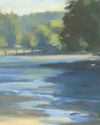
Movement in composition
Through an analysis of three masterworks, landscape painter and noted author MITCHELL ALBALA shows how you can animate landscape composition with movement
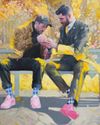
Shane Berkery
The Irish-Japanese artist talks to REBECCA BRADBURY about the innovative concepts and original colour combinations he brings to his figurative oil paintings from his Dublin garden studio

The Working Artist
Something old, something new... Our columnist LAURA BOSWELL has expert advice for balancing fresh ideas with completing half-finished work
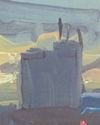
Washes AND GLAZES
Art Academy’s ROB PEPPER introduces an in-depth guide to incorporating various techniques into your next masterpiece. Artwork by STAN MILLER, CHRIS ROBINSON and MICHELE ILLING

Hands
LAURA SMITH continues her new four-part series, which encourages you to draw elements of old master paintings, and this month’s focus is on capturing hands

Vincent van Gogh
To celebrate The Courtauld’s forthcoming landmark display of the troubled Dutch master’s self-portraits, STEVE PILL looks at the stories behind 10 of the most dramatic works on display
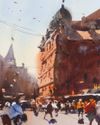
BRING THE drama
Join international watercolour maestro ALVARO CASTAGNET in London’s West End to paint a dramatic street scene
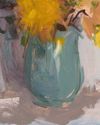
Serena Rowe
The Scottish painter tells STEVE PILL why time is precious, why emotional responses to colour are useful, and how she finds focus every day with the help of her studio wall

Bill Jacklin
Chatting over Zoom as he recovers from appendicitis, the Royal Academician tells STEVE PILL about classic scrapes in New York and his recent experiments with illustration